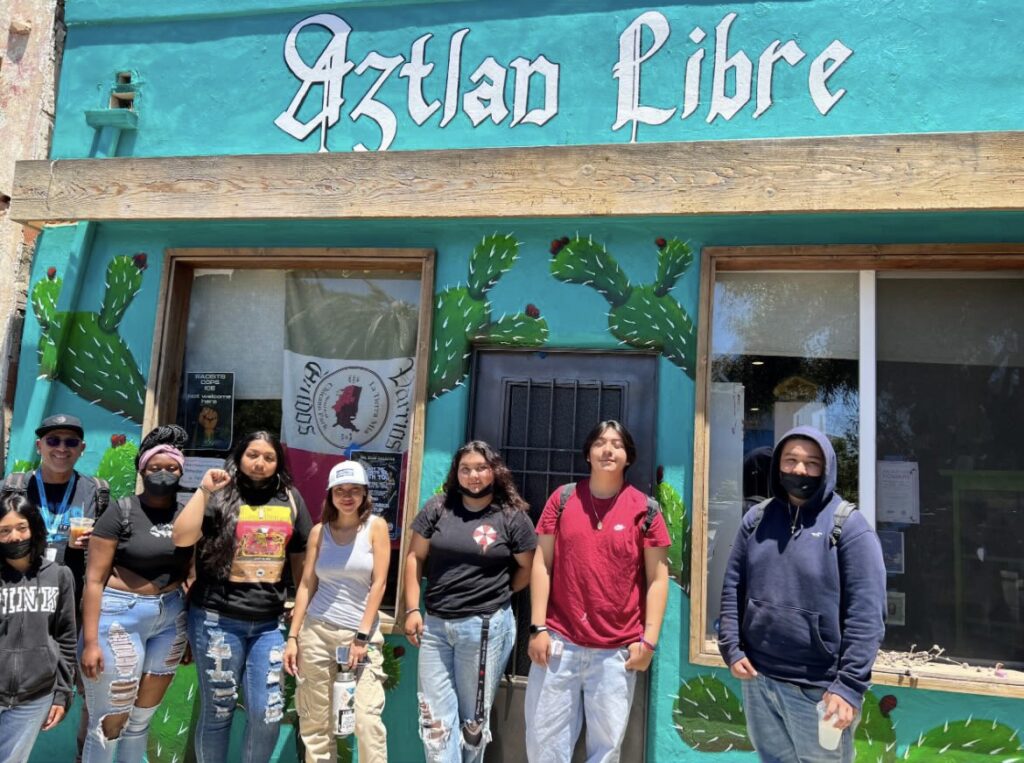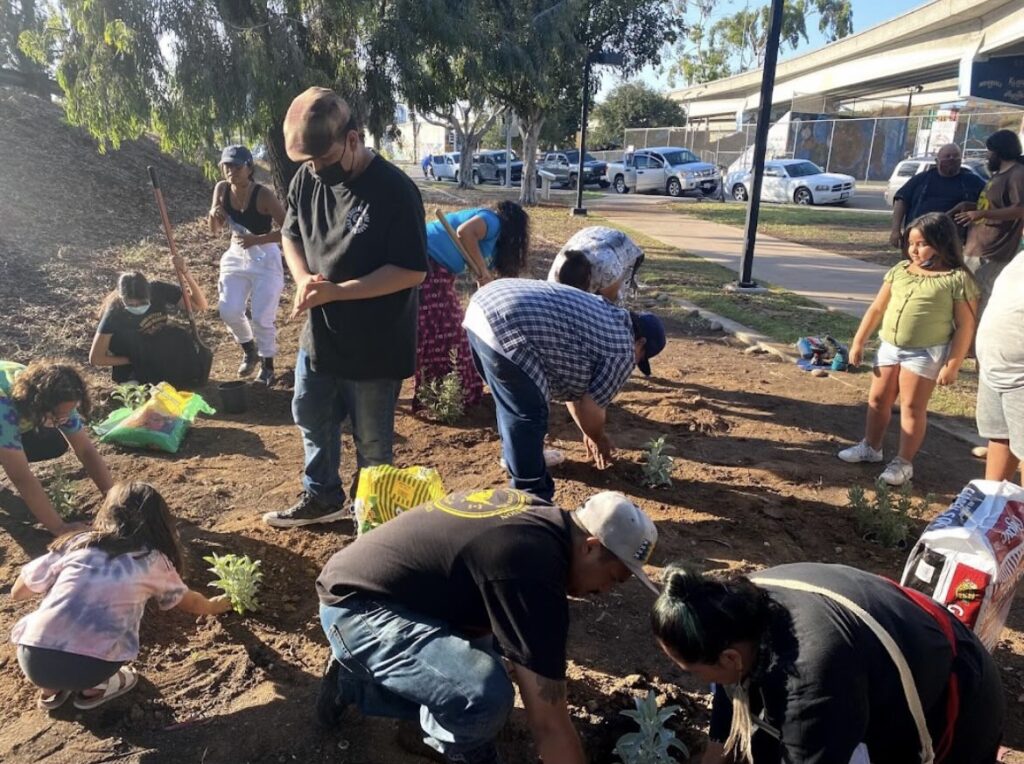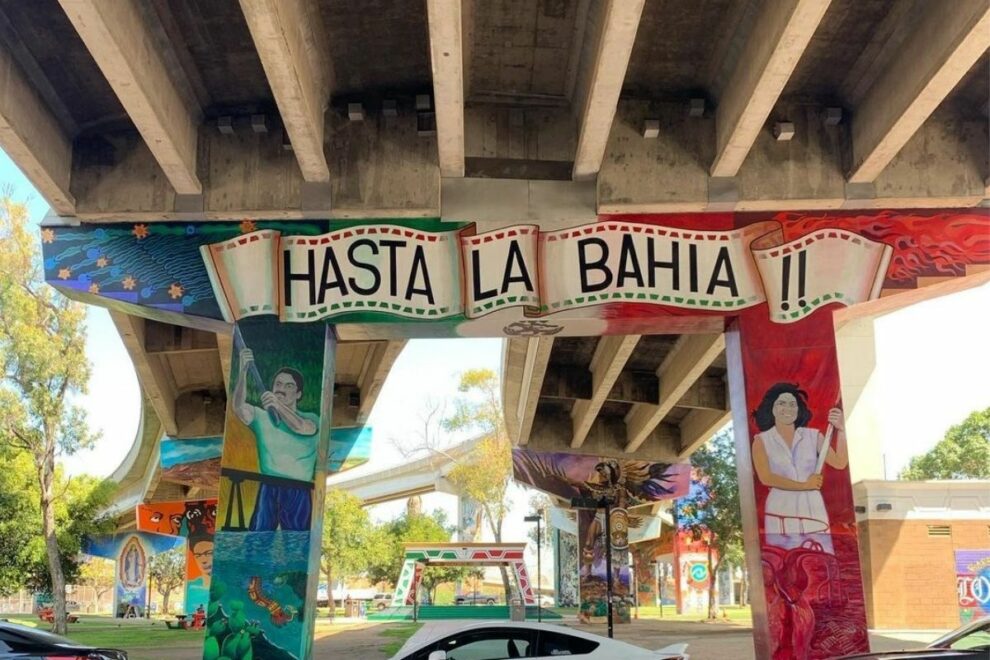The historic neighborhood of Barrio Logan is home to a variety of community-based organizations that work to serve the needs of its residents—from long time community staples such as the Chicano Federation, to the revolutionary work of mutual aid and self-defense groups such as Unión del Barrio, to the National Brown Berets de Aztlán.
Community led groups and collectives not only better the living conditions of Barrio residents, but communities throughout San Diego. One of the most recent additions to this rich tapestry of homegrown activism is the Aztlán Youth Brigade.
Founded in 2021, the Aztlán Youth Brigade is a youth driven grassroots organization that has become a space for neighborhood youth to learn about their Chicano roots, get involved in the community, and push themselves through self-determination.
Composed of youth ages 11 to 24, for the past two years the Aztlán Youth Brigade has been committed to organizing community clean ups, neighborhood food distributions, facilitating higher education and college plans, organizer/leader skill set workshops, and serving as a place where Barrio youth can learn actively learn about the history of the Chicano Movement.
Founding The Aztlán Youth Brigade

Although many people had a hand in the org’s co-founding, Raquel Esquivias, the current Chair for the Aztlán Youth Brigade has been instrumental in growing the Youth Brigade’s scope and reach within the community.
The initial inception of the Aztlán Youth Brigade began with the planting of the Chicano Park sage garden in 2021, when local neighborhood youth took to the park to plant sage, agave, and other native flora.
Esquivias quickly realized the power and significance of a youth driven, and decidedly Chicana/Chicano centric community org.
“What drove me to keep this going was a Zoom call about a month after plating the sage garden with Chicano Park’s sister territories and elders of the movement,” she recalled. “Everyone mentioned the same thing about a youth group. The elders are a big reason that the group was created, they want to see a new generation be empowered and I am proud to help achieve that goal. Since then we’ve continued to train the Aztlán Youth Brigade in organizing, events, and training.”
One way the Aztlán Youth Brigade has actively sought to recruit new members is through “Somos Chicano Camp,” a week-long youth camp curated by Revolucionarios de Aztlán to teach youth about the rich and intricate legacy of Chicano history and organizing.
“I didn’t know about the Aztlán Youth Brigade until after I attended the Somos Chicano Camp. That experience was what brought me into wanting to be a part of this revolutionary change,” said Vianca Mariaca-Gonzalez, a 17-year-old member and the Youth Brigade’s ‘Sergeant of Arms’recalled. “Even though there’s always something new to learn about our history. It taught me just enough of what it means to be a Chicano. I understand now that being a Chicana comes with so much responsibility. Activism, art, a love so strong for la communidad, resilience, self-determination are all that comes with being Chicana.”
Preserving The Community and Chicano Identity

For Esquivias, the importance of facilitating and maintaining a youth driven org centered around Chicana/Chicano identity goes deeper than just the immediate effects felt in the neighborhood.
In addition to the community work done in Barrio Logan, the Aztlán Youth Brigade has helped set up sister chapters in Chicano Park’s sister territories such as Ortega Park in Santa Barbara. As the two chapters keep irregular touch and help support each other’s initiatives. The Aztlán Youth Brigade’s mission to empower Chicano youth locally hasn’t been fought alone either.
Since its founding the Youth Brigade has worked with other local orgs in the neighborhood such as the Chicano Park Steering Committee, the CPSC Youth Lunch Distribution, Unión del Barrio, and the National Brown Berets. Esqivias Esquivias highlighted the Youth Brigade’s cooperative nature, and emphasized the importance of learning from both the successes and missteps of older community led groups.
“The Chicano movement is everywhere, it’s important to create and strengthen these bonds so that not one group feels isolated in their own place. With these bonds we also are able to share information and keep each other updated.”
The need for a disciplined multi-org coalition is particularly underscored by on-going battles that have waged in the neighborhood in recent years such as the fight against gentrification, hyper-aggressive policing, and food insecurity—all of which have become noticeably more pronounced to residents in the years following the COVID-19 pandemic.
For Vianca Mariaca-Gonzalez, these issues and others faced by the community have only strengthened her commitment to the Youth Brigade’s mission. “I joined [the Aztlán Youth Brigade] to be able to help people in the ways I’ve always wanted to be helped. I don’t like to see people struggle just because the system works to keep people like us down. I want to provide the community with the tools they need to see them thrive and succeed. I want to be the one to help make that change.”
Esquivias hopes that by providing spaces like these, along with the efforts put forth to better the neighborhood, members of the Aztlán Youth Brigade will be inspired to take on greater and more active roles in the community and continue the work that needs to be done. Esquivias stressed that while much has been done in just a few short years, the responsibility will ultimately fall on the youth of today to continue future work.
“The overall mission is to educate youth on different aspects of Chicano culture. As a group we support each other whether it be from writing and arts, or organizing. We want to have young Chicanos feel comfortable in their own orgullo. Our goal is to teach about the historical components of the struggle of the movement, and to have youth of like minds learn and grow together.”












